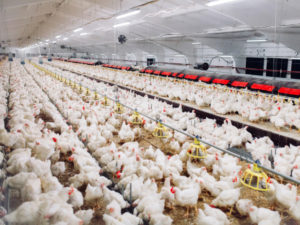
By David Tadevosian @ Shutterstock.com
For decades chicken growers have been working to speed up the rate at which a chicken grows from chick to roaster size. To reach the target weight of 6.3 pounds today takes 47 days, as opposed to double that 50 years ago. But the acceleration in chicken growth hasn’t come without its own problems. The Wall Street Journal’s Jacob Bunge reports on what has become known as “spaghetti meat.” He writes:
Chicken companies spent decades breeding birds to grow rapidly and develop large breast muscles. Now the industry is spending hundreds of millions of dollars to deal with the consequences ranging from squishy fillets known as “spaghetti meat,” because they pull apart easily, to leathery ones known as “woody breast.”
The abnormalities pose no food safety risk, researchers and industry officials say. They are suspected side effects of genetic selection that now allows meat companies to raise a 6.3-pound bird in 47 days, roughly twice as fast as 50 years ago, according to the National Chicken Council.
That efficiency drive has helped U.S. meat giants such as Tyson Foods Inc., TSN -0.50%Pilgrim’s Pride Corp. PPC -0.59% , Perdue Farms Inc. and Sanderson Farms Inc.SAFM -1.31% produce a record 42 billion pounds of chicken nuggets, tenders and other products in 2018. Now, it’s adding an estimated $200 million or more in annual industry expenses to identify and divert breast fillets that are too tough, too squishy or too striped with bands of white tissue to sell in restaurants or grocery stores, according to researchers at the University of Arkansas.
“There is proof that these abnormalities are associated with fast-growing birds,” said Dr. Massimiliano Petracci, a professor at the University of Bologna in Italy, who leads a team of researchers investigating the chicken breast problems in breeds used in commercial farms.
Read more here.
